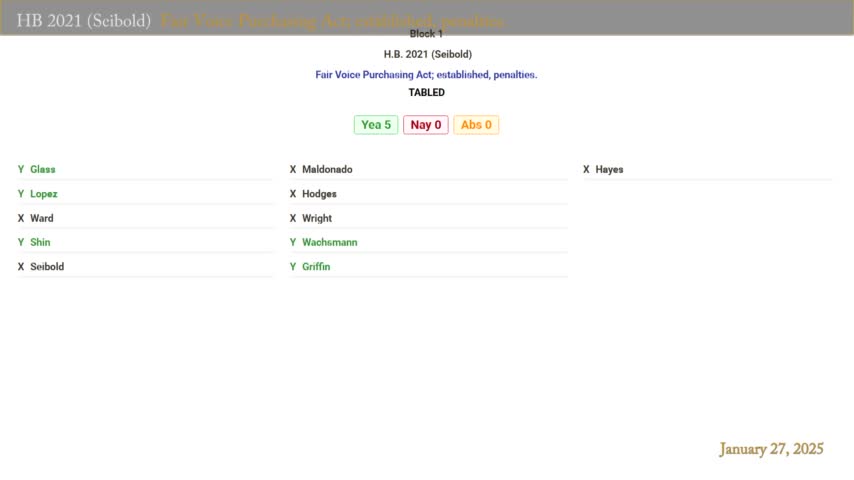Subcommittee approves bill to extend posthumous publicity rights, add protections for digital replicas
Get AI-powered insights, summaries, and transcripts
Subscribe
Summary
The subcommittee voted to report HB 2462 as substituted after debate over protections for digital replicas of voice and likeness, First Amendment exceptions and posthumous-duration provisions. Supporters said the bill protects artists and estates; tech groups warned of constitutional and implementation risks.
The subcommittee approved House Bill 2462 as substituted, a measure that would extend and clarify Virginia’s right-of-publicity law to include voice and explicit protections for unauthorized digital replicas produced by artificial‑intelligence and other emerging technologies.
Delegate Glass, who sponsored the bill, said the substitute inserts voice into the existing name-and-likeness statute, extends posthumous protection beyond the current 20‑year term and adds prohibitions on unauthorized commercial use of convincing digital replicas. The substitute also retains exceptions for satire, commentary and news reporting to preserve First Amendment protections, the sponsor said.
“This bill ensures that these replicas are created and used responsibly, respectfully, and the rights of the individual's likenesses are respected,” Glass said, adding that the measure is meant to protect creators and their estates from exploitation.
Supporters included the Recording Academy and other creator groups. Michael Lewin of the Recording Academy said the bill updates a legal framework that otherwise could leave the recorded-voice and likeness rights of past performers vulnerable to unauthorized digital resurrection. “We’re grateful for Delegate Glass’ leadership to narrowly update the Commonwealth’s existing right of publicity law,” Lewin said.
Opponents including trade groups and free-speech advocates urged caution. The Motion Picture Association’s representative said stakeholders had earlier discussed a registry for posthumous rights and questioned the length of any extended posthumous term; the MPAA urged careful alignment with federal law and existing proposals. The Chamber of Progress argued a parallel federal bill had unresolved constitutional problems and warned that overly broad state protections risk chilling creative uses and speech.
Committee members debated the balance between protecting creators and preserving free expression. Several members said the substitute includes First Amendment exceptions but also noted how content platforms might react to takedown pressure in practice.
The subcommittee moved and approved the substitute and reported the bill by a recorded vote of 8 to 2. The bill will now proceed to the next committee or floor calendar, depending on the legislative schedule and any required fiscal referrals.
